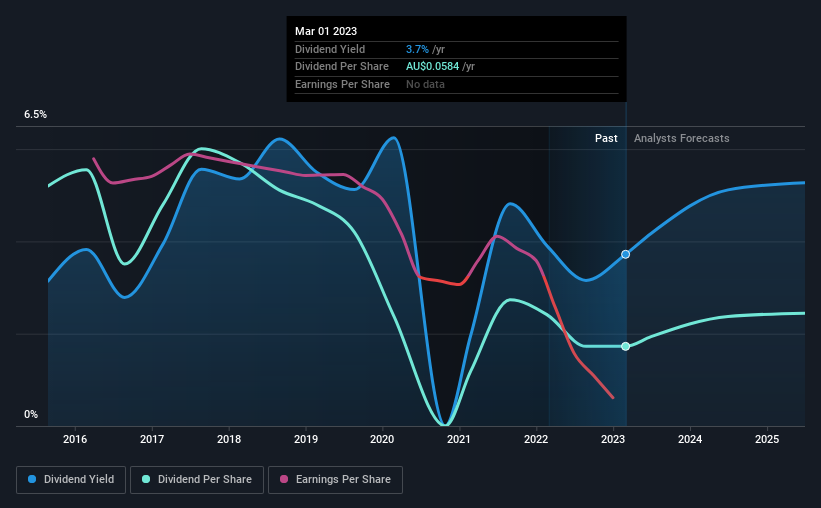- Australia
- /
- Healthcare Services
- /
- ASX:REG
Regis Healthcare (ASX:REG) Is Paying Out Less In Dividends Than Last Year
Regis Healthcare Limited (ASX:REG) has announced it will be reducing its dividend payable on the 14th of April to A$0.02, which is 43% lower than what investors received last year for the same period. However, the dividend yield of 3.7% is still a decent boost to shareholder returns.
See our latest analysis for Regis Healthcare
Regis Healthcare's Payment Has Solid Earnings Coverage
If the payments aren't sustainable, a high yield for a few years won't matter that much. The company is paying out a large amount of its cash flows, even though it isn't generating any profit. This makes us feel that the dividend will be hard to maintain.
Looking forward, earnings per share is forecast to rise exponentially over the next year. If the dividend continues along recent trends, we estimate the payout ratio will be 3.9%, so there isn't too much pressure on the dividend.

Regis Healthcare's Dividend Has Lacked Consistency
Looking back, Regis Healthcare's dividend hasn't been particularly consistent. If the company cuts once, it definitely isn't argument against the possibility of it cutting in the future. The dividend has gone from an annual total of A$0.176 in 2016 to the most recent total annual payment of A$0.0584. The dividend has fallen 67% over that period. Declining dividends isn't generally what we look for as they can indicate that the company is running into some challenges.
The Dividend Has Limited Growth Potential
Given that the track record hasn't been stellar, we really want to see earnings per share growing over time. Regis Healthcare's EPS has fallen by approximately 65% per year during the past five years. This steep decline can indicate that the business is going through a tough time, which could constrain its ability to pay a larger dividend each year in the future. On the bright side, earnings are predicted to gain some ground over the next year, but until this turns into a pattern we wouldn't be feeling too comfortable.
Regis Healthcare's Dividend Doesn't Look Great
To sum up, we don't like when dividends are cut, but in this case the dividend may have been too high to begin with. The company's earnings aren't high enough to be making such big distributions, and it isn't backed up by strong growth or consistency either. The dividend doesn't inspire confidence that it will provide solid income in the future.
Market movements attest to how highly valued a consistent dividend policy is compared to one which is more unpredictable. Still, investors need to consider a host of other factors, apart from dividend payments, when analysing a company. To that end, Regis Healthcare has 2 warning signs (and 1 which is a bit unpleasant) we think you should know about. If you are a dividend investor, you might also want to look at our curated list of high yield dividend stocks.
New: AI Stock Screener & Alerts
Our new AI Stock Screener scans the market every day to uncover opportunities.
• Dividend Powerhouses (3%+ Yield)
• Undervalued Small Caps with Insider Buying
• High growth Tech and AI Companies
Or build your own from over 50 metrics.
Have feedback on this article? Concerned about the content? Get in touch with us directly. Alternatively, email editorial-team (at) simplywallst.com.
This article by Simply Wall St is general in nature. We provide commentary based on historical data and analyst forecasts only using an unbiased methodology and our articles are not intended to be financial advice. It does not constitute a recommendation to buy or sell any stock, and does not take account of your objectives, or your financial situation. We aim to bring you long-term focused analysis driven by fundamental data. Note that our analysis may not factor in the latest price-sensitive company announcements or qualitative material. Simply Wall St has no position in any stocks mentioned.
About ASX:REG
Regis Healthcare
Engages in the provision of residential aged care services in Australia.
Reasonable growth potential with mediocre balance sheet.
Similar Companies
Market Insights
Community Narratives


Recently Updated Narratives


MINISO's fair value is projected at 26.69 with an anticipated PE ratio shift of 20x


Fiverr International will transform the freelance industry with AI-powered growth

Constellation Energy Dividends and Growth
Popular Narratives


MicroVision will explode future revenue by 380.37% with a vision towards success


NVDA: Expanding AI Demand Will Drive Major Data Center Investments Through 2026



